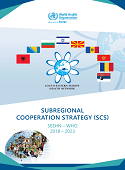Subregional Cooperation Strategy (SCS) SEEHN – WHO, 2018 – 2023 (2018)

Download
The South-eastern Europe Health Network (SEEHN) plays a critical role in promoting health in Albania, Bosnia and Herzegovina, Bulgaria, Israel, Montenegro, the Republic of Moldova, Romania, Serbia and the former Yugoslav Republic of Macedonia, and has a long-standing collaboration with the World Health Organization (WHO) Regional Office for Europe regarding the subregional health agenda.
Given the universality of the United Nations 2030 Agenda for Sustainable Development, which calls for all countries to fully engage in its implementation at all levels, the SEEHN Secretariat and the WHO Regional Office for Europe have jointly developed this strategic document, which aims to support achievement of United Nations Sustainable Development Goal (SDG) 3 and other health-related SDG targets, especially the key target of universal health coverage, in the member countries of SEEHN.
This subregional cooperation strategy (SCS), which has been shaped through a series of consultations with representatives at all levels of SEEHN and the WHO Regional Office for Europe, as well as scientific institutions in south-eastern Europe, has the following seven strategic priorities:
- Sustain and strengthen collaborative efforts between SEEHN and the WHO Regional Office for Europe.
- Achieve SDG 3 and other health-related SDGs in SEEHN member countries.
- Work towards achieving universal health coverage in SEEHN member countries.
- Strengthen public health in SEEHN member countries.
- Ensure emergency preparedness and response in SEEHN member countries.
- Promote partnerships for health and well-being in SEEHN member countries.
- Achieve policy coherence between WHO global goals and SEEHN member countries’ economic, social and environmental policies.



